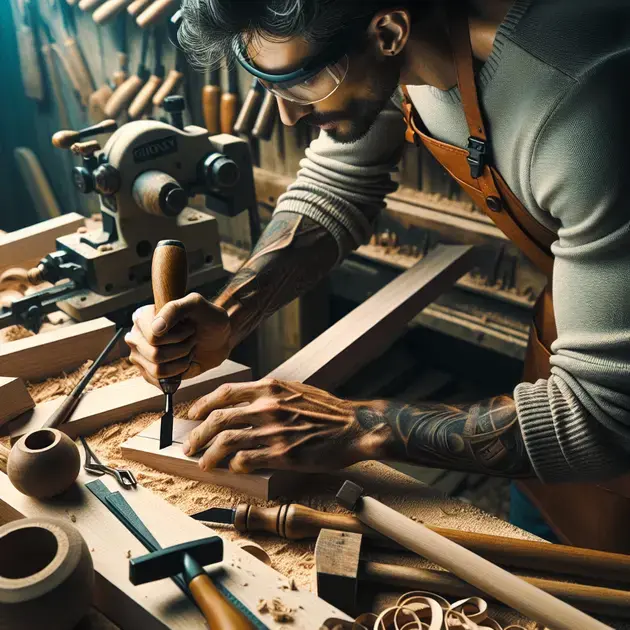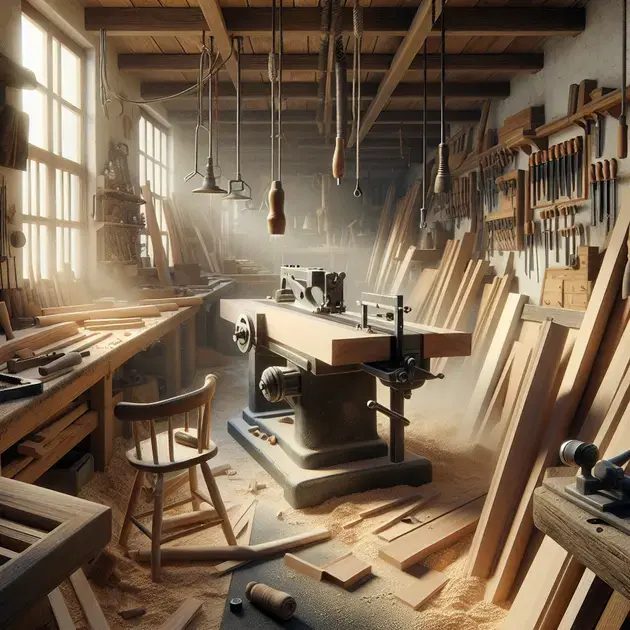Are you ready to master the art of woodworking? This beginner’s guide will take you through the fundamentals of woodworking, helping you understand the tools, techniques, and materials needed to create stunning wood pieces. Whether you’re interested in building furniture, carving decorations, or crafting practical items, this guide is designed to equip you with the knowledge and skills necessary to excel in this timeless craft.
Woodworking continues to gain popularity as a hobby and a profession, with more people discovering the joy of working with their hands and creating beautiful wooden projects. As you embark on this woodworking journey, you’ll learn how to safely operate tools, select the right type of wood for each project, and unleash your creativity to bring your designs to life. With dedication and practice, you’ll soon be on your way to becoming a skilled woodworker capable of producing high-quality pieces that showcase your talent and passion.

Master the Art of Woodworking: A Beginner’s Guide – Introduction
Welcome to the beginner’s guide to mastering the art of woodworking! Whether you’re new to woodworking or looking to hone your skills, this guide will provide you with the essential knowledge and tips to get started on your woodworking journey. Woodworking is a versatile and rewarding hobby that allows you to create beautiful and functional pieces with your hands.
To begin your woodworking adventure, it’s essential to understand the basics of woodworking tools and techniques. By mastering these fundamentals, you’ll be able to tackle a variety of woodworking projects with confidence and precision. Let’s dive into the world of woodworking and explore the tools and techniques that will set you on the path to success.
One great resource to learn more about woodworking basics is the Woodworking for Beginners app, available for download on both Android and iOS devices. This app offers tutorials, tips, and project ideas suitable for woodworkers of all skill levels. By following along with the app’s step-by-step instructions, you’ll quickly grasp the essential concepts of woodworking and be ready to embark on your first project.
As you progress in your woodworking journey, don’t forget to practice patience and persistence. Mistakes are part of the learning process, so don’t get discouraged if your first few projects aren’t perfect. With dedication and practice, you’ll soon be creating stunning pieces that showcase your woodworking skills.
Stay tuned for more in-depth guides on woodworking tools, techniques, and project ideas as you continue to master the art of woodworking.
Understanding Woodworking Tools and Techniques
Understanding woodworking tools and techniques is crucial for any aspiring woodworker. Before diving into your first project, it’s essential to familiarize yourself with the various tools used in woodworking and the techniques required to use them effectively.
Woodworking Tools:
One of the best ways to learn about woodworking tools is through hands-on experience and guidance from experienced woodworkers. Consider joining a local woodworking class or workshop where you can learn how to safely and effectively use tools such as saws, drills, chisels, and sanders.
Woodworking Techniques:
Learning woodworking techniques such as measuring, cutting, sanding, and finishing is essential for producing high-quality woodwork. Practice these techniques on scrap wood before starting your projects to build confidence and skill.
To deepen your understanding of woodworking tools and techniques, check out online tutorials and resources such as the Woodworking Guild website. This platform offers comprehensive guides, video tutorials, and forums where you can learn from experienced woodworkers and interact with a supportive community.
By honing your skills in woodworking tools and techniques, you’ll be well-equipped to tackle a wide range of woodworking projects and unleash your creativity in the workshop.
Choosing the Right Wood for Your Project
Selecting the right type of wood for your woodworking project is essential for achieving the desired aesthetic and functional outcome. Different wood species have unique characteristics in terms of color, grain pattern, durability, and workability, so it’s crucial to choose the appropriate wood for your specific project.
Wood Selection Criteria:
Consider factors such as the project’s intended use, the desired appearance, and the woodworking techniques you’ll be using when selecting wood species. For furniture projects that require strength and durability, hardwoods like oak, maple, and walnut are excellent choices. Softwoods such as pine and cedar are ideal for projects that prioritize ease of workability and affordability.
Wood Sourcing:
When sourcing wood for your project, opt for reputable lumber yards, woodworking stores, or online suppliers that offer a wide selection of high-quality wood species. Inspect the wood for defects, such as knots, warping, or cracks, and choose boards with consistent color and grain for a cohesive finished look.
To explore a variety of wood species and their characteristics, visit the Wood Database website, where you can access a comprehensive database of wood types, including detailed information on each species’ properties and recommended uses. This resource will help you make informed decisions when selecting wood for your woodworking projects.
By carefully choosing the right wood for your project, you’ll enhance the beauty and functionality of your creations and ensure long-lasting durability and satisfaction with your woodworking endeavors.

**Introduction to Woodworking Essentials**
Understanding the Basics
When diving into woodworking, it’s crucial to grasp the fundamental tools and techniques. From saws and chisels to sanders and drills, each tool plays a unique role in the woodworking process. Familiarizing yourself with these essentials can make your projects more efficient and professional-looking.
Step-by-step guide:
1. Start by learning about the different types of wood and their characteristics.
2. Understand how to properly measure and cut wood using a saw and other cutting tools.
3. Practice using a chisel to create intricate designs and shapes in your wood pieces.
4. Experiment with different sanding techniques to achieve a smooth and polished finish.
5. Master the art of drilling precise holes for joints and other woodworking connections.
Choosing the Right Materials
When embarking on a woodworking project, selecting the appropriate materials is essential for the final outcome. The type of wood, finish, and hardware you choose can greatly impact the durability and aesthetics of your creation. By understanding the properties of different woods and finishes, you can ensure your projects stand the test of time.
Step-by-step guide:
1. Research the characteristics of various wood types to determine the best option for your project.
2. Consider the desired finish of your project and choose a compatible wood stain or paint.
3. Select hardware and accessories that complement the style and function of your woodworking piece.
4. Invest in high-quality materials to enhance the overall quality and longevity of your creations.
5. Experiment with different combinations of wood, finishes, and hardware to develop your unique woodworking style.
Safety Precautions in Woodworking
Woodworking can be a rewarding and fulfilling hobby, but it also comes with its risks. Prioritizing safety in your workshop is paramount to prevent accidents and injuries. By following a few simple guidelines and investing in the appropriate safety gear, you can enjoy woodworking without compromising your well-being.
Step-by-step guide:
1. Always wear protective gear such as goggles, dust masks, and ear protection when operating power tools.
2. Keep your work area clean and organized to prevent tripping hazards and clutter.
3. Use tools and equipment properly, following manufacturer instructions and guidelines.
4. Avoid distractions while woodworking to maintain focus and prevent accidents.
5. Seek guidance from experienced woodworkers or take safety courses to enhance your knowledge and skills in workshop safety.
**
Conclusion
**
In the realm of woodworking essentials, understanding the basics is paramount. By familiarizing yourself with fundamental tools like saws, chisels, sanders, and drills, you pave the way for efficient and professional-looking projects. Each tool serves a unique purpose, contributing to the overall outcome of your woodworking endeavors. Mastering these essentials sets a strong foundation for your craft.
When it comes to choosing the right materials, the impact on your final creation cannot be overstated. Selecting the appropriate wood type, finish, and hardware is crucial for ensuring durability and enhancing aesthetics. By delving into the properties of different woods and finishes, you empower yourself to create timeless pieces that stand the test of time. The meticulous selection of materials plays a pivotal role in elevating the quality of your woodworking projects.
Safety precautions in woodworking are non-negotiable. While woodworking offers fulfillment, it also poses risks. Prioritizing safety in your workshop through proper guidelines and suitable safety gear is essential to prevent accidents and injuries. Maintaining a clean work area, using tools correctly, and staying focused are fundamental practices for a safe woodworking environment. Seeking advice from experienced woodworkers and investing in safety courses further bolsters your knowledge and skills, ensuring a secure woodworking journey.